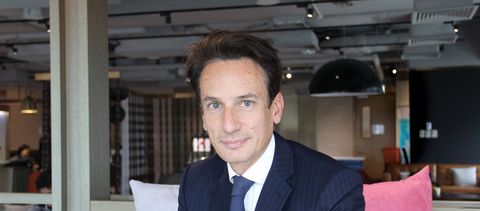Analyses & Studies • Sectors & markets • Foresight • Publications
HongKongEcho: The new insurance paradigm

The future of insurance lies in helping you get better. The ambition for French insurance giant AXA may sound utopian, but it’s symbolic of the new role for insurers says its Hong Kong CEO.
“The thing with insurance is that it’s statistically better – in the short term – to sell a strong value proposition that people never use. Traditionally, that’s how you make money,” says Etienne Bouas-Laurent, CEO of AXA Hong Kong. “Our philosophy is a little bit different.”
It could be easy to think that it’s business as usual for the insurance giant. Hong Kong’s US$64 billion insurance market continues to grow in double digits on average over the past five years and the French multinational ranks an enviable 1st in Property & Casualty, 2nd in Health and 6th in Life Insurance in Hong Kong according to the market statistics published by Insurance Authority.
Despite the numbers, the city remains curiously under-insured with less than 50% of the population benefiting from private health insurance coverage. An affordable public system and wealth disparities are principle reasons – but it’s also a question of encouraging young people to insure themselves early.
The government’s push to unclog the public system is part of the reasoning behind next year’s Voluntary Health Insurance Scheme which will provide tax deductions for the newly insured. “It’s also about improving the trust in private insurance. Many insurance contracts today only cover you partially, there are limits per disease and so on – it’s a nightmare. We want to move away from this,” explains Etienne.
A broader transformation is also taking place, he assures us. “Strictly speaking, our job used to be simply to reimburse you. Now it’s to partner with you and help to manage your health. It’s more human. That is a completely different proposition.”
Apps for all
At the forefront of that new proposition? Prevention and wellness, for a start. In a move echoing this, their new health business unit is being headed by a doctor rather than the classically appointed business person, says Etienne.
Among the services to reinforce this proposition – following partnerships with two leading startups – are two wellness-targeting apps: a ‘symptom checker’ (essentially an algorithm to give feedback on some initial symptoms) and a health management platform for sufferers of diabetes to manage and improve their condition. The latter will involve an app which will be able to monitor the improvement of a user’s health and consequently reduce their premium over time.
“Again, we’re moving from a model where many insurers don’t want to deal with people suffering from chronic diseases to one where we’re looking at ways to help people – not just to become clients – but to actually get better.”
Likewise the much-touted wave of telemedicine is on their horizons. Across the border in mainland China the likes of Ping An Insurance are grabbing headlines with remote doctor-at-distance services, but Etienne urges some caution.
“I feel it’s not entirely convincing in a Hong Kong context. It’s very difficult for a doctor who doesn’t know you to issue a diagnostic without a face-to-face consultation. There are obviously regulatory concerns as well.”
Instead their offer will specifically target cases where customers can receive e-prescriptions and recommendations for their chronic illness from their medical network specialist, for example.
The human element
“Digital is important because it allows us to do things like leveraging our data better and quickening processes. But it’s really part of a broader process that goes back to humanising our insurance offer and our customer experience,” says Etienne.
A global coverage for diseases, an unrivalled hospital network, moving previously offshore customer services directly to Hong Kong – Etienne reels off examples of a humanisation beyond the world of digital.
“We often talk about digital and its implications for employment. Actually we see an increasing demand for advice and, consequently, people. Customers are increasingly demanding, but that is not just a question of technology.”








